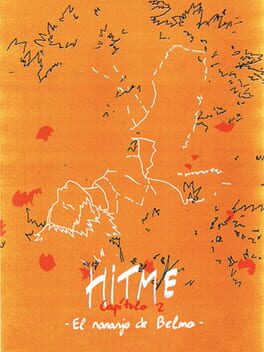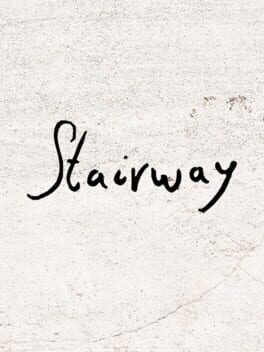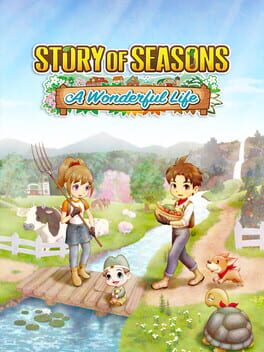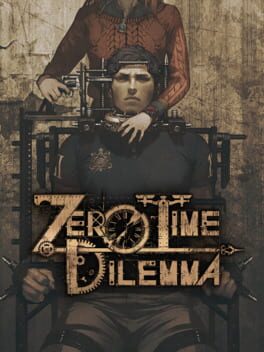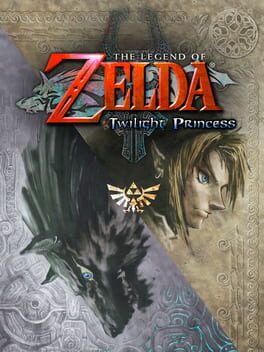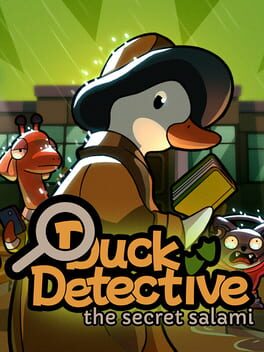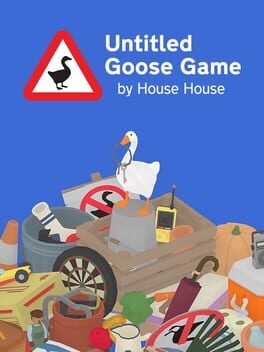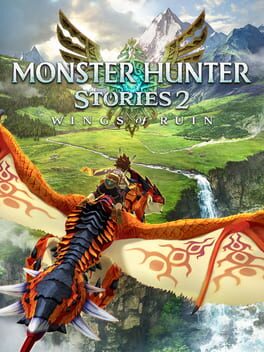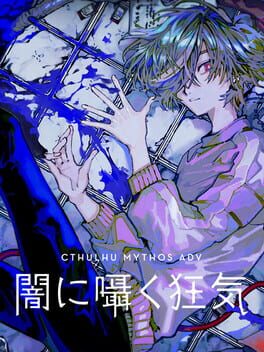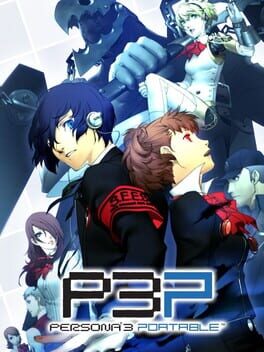kaeruk
620 Reviews liked by kaeruk
Hitme 2
2022
This is a short visual novel encompassing the first two chapters of the Hitme story, so even though it says "2", you can start here (and the dev even recommends it).
Everything about this feels so carefully crafted to fit a vibe that I feel like any criticism is exactly what the dev was going for. The use of "u" for "you" in the English translation sometimes definitely breaks my immersion, though.
It's a very violent and sweet story about polyamorous gay men and multiple kinds of recovery, so if that concept entices you, I think you'll ultimately have a high opinion of it too. It does have scenes of sexual intimacy and a fair amount of suicidal behavior, in case either one concerns or interests you more.
Everything about this feels so carefully crafted to fit a vibe that I feel like any criticism is exactly what the dev was going for. The use of "u" for "you" in the English translation sometimes definitely breaks my immersion, though.
It's a very violent and sweet story about polyamorous gay men and multiple kinds of recovery, so if that concept entices you, I think you'll ultimately have a high opinion of it too. It does have scenes of sexual intimacy and a fair amount of suicidal behavior, in case either one concerns or interests you more.
Stairway
2024
I was willing to give this one props for its premise but, after playing it, I did a bit of reading around and discovered that an entire world of spot-the-difference-in-this-creepy-liminal-space games (a.k.a. Exit 8 clones) has suddenly manifested on Steam in the past year or so. And I can kinda see why; it feels like it would take minimal effort to rattle one of these out and have it be reasonably effective. For better or for worse, Stairway happens to be the game in this niche that I first stumbled upon.
Like, Stairway achieves what it sets out to do competently enough. Every time I missed an anomaly and ended up resetting to the top floor I'd become more and more paranoid, and ended up knowing the room concerningly well. The room itself is varied enough to make some of the anomalies pretty fiendish to detect, and it is quite satisfying to find some of them, although some are so painfully obvious that I don't really know what the point of them is at all.
But Stairway commits a cardinal sin of gaming; it's really fucking boring. You have to get 10 rooms correct in a row to win this and, with how obtuse some of the differences get, those 10 rooms feel like agonisingly many. I didn't like playing this, and every time I missed some 5-pixel wide scribble on a poster or some such similar crap and got reset to the top of the building, I wanted to throw my fucking PC out the window.
So yeah, I guess this weird microgenre isn't for me. I have no idea whether Stairway is a good representative of it (I will go and try Exit 8 at some point to get a bit more context), but it is free so it's probably a decent enough entry point for anyone interested. Do be prepared to lean on Dr Google for the last couple of anomalies though because there really are one or two which are just stupid.
Like, Stairway achieves what it sets out to do competently enough. Every time I missed an anomaly and ended up resetting to the top floor I'd become more and more paranoid, and ended up knowing the room concerningly well. The room itself is varied enough to make some of the anomalies pretty fiendish to detect, and it is quite satisfying to find some of them, although some are so painfully obvious that I don't really know what the point of them is at all.
But Stairway commits a cardinal sin of gaming; it's really fucking boring. You have to get 10 rooms correct in a row to win this and, with how obtuse some of the differences get, those 10 rooms feel like agonisingly many. I didn't like playing this, and every time I missed some 5-pixel wide scribble on a poster or some such similar crap and got reset to the top of the building, I wanted to throw my fucking PC out the window.
So yeah, I guess this weird microgenre isn't for me. I have no idea whether Stairway is a good representative of it (I will go and try Exit 8 at some point to get a bit more context), but it is free so it's probably a decent enough entry point for anyone interested. Do be prepared to lean on Dr Google for the last couple of anomalies though because there really are one or two which are just stupid.
A breathtakingly beautiful retelling of one of my favorite novels, refocused on the most tender and empathetic elements of the original. Of course this is my shit, and this makes a better companion to Frankenstein than anything I can think of. If you have any opportunity to, please use this in the classroom.
I feel like a lot of the negative reviews for this game on steam specifically are coming from those who didn't see the charm and appeal of the original. A Wonderful Life was a weird Harvest Moon title. Time passed by, people aged, the game was slow, the town was small, the villagers were odd and had a lot of quirks. They went for realism in certain aspects that aren't in any other SoS or HM titles - and that's why I love AWL so much.
This remake captures so much soul of the original, I'm so thankful for that because I was worried they would make it more palatable to blend in with the other SoS titles. And I'm so glad they didn't.
This is a weird and charming little game, faithful to the original with a lot of QoL updates. I think my biggest complaints with it would be the hitboxing for animal feed bins and the mines, as well as the lack of dialogue for spouses especially the newer added male ones.
But overall this remake made me so happy and brought back so much nostalgia for me!
This remake captures so much soul of the original, I'm so thankful for that because I was worried they would make it more palatable to blend in with the other SoS titles. And I'm so glad they didn't.
This is a weird and charming little game, faithful to the original with a lot of QoL updates. I think my biggest complaints with it would be the hitboxing for animal feed bins and the mines, as well as the lack of dialogue for spouses especially the newer added male ones.
But overall this remake made me so happy and brought back so much nostalgia for me!
Baldur's Gate 3
2023
I don't think I'm going to forget this game for a very long time. If at all.
As someone who's never really played CRPGs this game was barely on my radar right up to its release. I kept forgetting what it was and innately rejecting it as something that would be too hard to get into and demand so much time that I'd never get around to finishing it. I don't remember exactly what it was that finally sold me on trying it, but once my interest was piqued I was thoroughly "in" - (honestly, might've been an interview with the Larian head in the FPS Podcast)
I want to keep this one "short" so I won't be going into much detail, but this game is insane. The fact every conversation is mocapped adds so much to the immersion, and the writing and performances are thoroughly excellent to boot. The world designs and mechanics allow for heaps of creative freedom, so much so that the previous "obvious" GOTY contender for this year has (imo) been given a run for its money. Tears of the Kingdom looked to have it on lock, in large part due to it's player freedom... I can't believe Larian came along in the same year to one-up them in this regard, but perhaps the coveted title isn't as in-the-bag as once thought. [Especially considering the slew of flaws TOTK brought with it from BOTW... hell I still haven't finished it lol]
Anyway! I adore this game, it's been forever since I got so lost that 12-15 hours could pass without me noticing, and that's what this game has been giving me almost every day for around a month now. I'm already excited to replay it and take different paths because - while I did follow every quest as far as I could without committing to conflicting ones - I know damn well there are countless hours of content, encounters and characters that I didn't see. I'm also eager to play with a controller and see how different the third person perspective is.
To include a gripe, the biggest downside of the game is either the combat being pretty brutal at times if you're not prepared or familiar with strategies that can be game-changing (protip: you can heal multiple people with splashed potions, and if you stand on fire all you have to do is drop the pot, it's free!) In spite of this, the combat was still one of my favourite parts because there's always so much you can do and once you find your method, it's amazing.
Second point: Silent protagonist.. The narrator is amazing and I love her, and the custom MC's voicelines for certain things are a nice touch, but there are some conversations that feel kinda weird having your response just be clicking the line without audio, or watching yourself pull a face instead of saying anything. Small issue that I got used to quickly but yeah, kinda weird. I wonder if playing as the Legacy characters negates this 🤔
That's it! I've rambled enough, if you're interested please give this game a shot, yes it's long but the majority of it is also optional and you could always do things the quick and easy way if you prefer. If you can't tell this is my current GOTY, which is insane because I'll have gotten a Final Fantasy, a Resident Evil and Alan Wake 2 this year (jury's still out on that last one 👀)
Hope you've all been well, quick shoutout to Paranormasight while I'm here. Idk if I'll bother reviewing but play it blind, it's really good! Have a good September folks, next review will be God knows what. I'm onto Sea of Stars and Starfield next. Thanks for reading!😌
P.S. Quick addendum I've heard people say Act 3 is bloated but I think it's just more dense and has a lot of quest conclusions and bigger encounters and all that. Also heard people say the ending is sudden but they must've gotten less satisfying ones because mine felt very well paced. The only things it didn't immediately address either aren't important or could easily be DLC follow-ups.
As someone who's never really played CRPGs this game was barely on my radar right up to its release. I kept forgetting what it was and innately rejecting it as something that would be too hard to get into and demand so much time that I'd never get around to finishing it. I don't remember exactly what it was that finally sold me on trying it, but once my interest was piqued I was thoroughly "in" - (honestly, might've been an interview with the Larian head in the FPS Podcast)
I want to keep this one "short" so I won't be going into much detail, but this game is insane. The fact every conversation is mocapped adds so much to the immersion, and the writing and performances are thoroughly excellent to boot. The world designs and mechanics allow for heaps of creative freedom, so much so that the previous "obvious" GOTY contender for this year has (imo) been given a run for its money. Tears of the Kingdom looked to have it on lock, in large part due to it's player freedom... I can't believe Larian came along in the same year to one-up them in this regard, but perhaps the coveted title isn't as in-the-bag as once thought. [Especially considering the slew of flaws TOTK brought with it from BOTW... hell I still haven't finished it lol]
Anyway! I adore this game, it's been forever since I got so lost that 12-15 hours could pass without me noticing, and that's what this game has been giving me almost every day for around a month now. I'm already excited to replay it and take different paths because - while I did follow every quest as far as I could without committing to conflicting ones - I know damn well there are countless hours of content, encounters and characters that I didn't see. I'm also eager to play with a controller and see how different the third person perspective is.
To include a gripe, the biggest downside of the game is either the combat being pretty brutal at times if you're not prepared or familiar with strategies that can be game-changing (protip: you can heal multiple people with splashed potions, and if you stand on fire all you have to do is drop the pot, it's free!) In spite of this, the combat was still one of my favourite parts because there's always so much you can do and once you find your method, it's amazing.
Second point: Silent protagonist.. The narrator is amazing and I love her, and the custom MC's voicelines for certain things are a nice touch, but there are some conversations that feel kinda weird having your response just be clicking the line without audio, or watching yourself pull a face instead of saying anything. Small issue that I got used to quickly but yeah, kinda weird. I wonder if playing as the Legacy characters negates this 🤔
That's it! I've rambled enough, if you're interested please give this game a shot, yes it's long but the majority of it is also optional and you could always do things the quick and easy way if you prefer. If you can't tell this is my current GOTY, which is insane because I'll have gotten a Final Fantasy, a Resident Evil and Alan Wake 2 this year (jury's still out on that last one 👀)
Hope you've all been well, quick shoutout to Paranormasight while I'm here. Idk if I'll bother reviewing but play it blind, it's really good! Have a good September folks, next review will be God knows what. I'm onto Sea of Stars and Starfield next. Thanks for reading!😌
P.S. Quick addendum I've heard people say Act 3 is bloated but I think it's just more dense and has a lot of quest conclusions and bigger encounters and all that. Also heard people say the ending is sudden but they must've gotten less satisfying ones because mine felt very well paced. The only things it didn't immediately address either aren't important or could easily be DLC follow-ups.
Paradise Killer
2020
It's a real shame to say but I think this game is too well made for me to enjoy it properly 😔
That may sound off, but my score is personal to my experience and my enjoyment, which unfortunately both grew more strained the longer I played for. To be clear off the bat, this game being a fully explorable map was not something I expected at all, especially not anything so big and complete, it's wild really. That aside though, the investigating areas and interrogating characters is exactly what I wanted, and there's a lot of that which was perfect... Until there was a little too much of it.
It feels strange to say, but without spoiling anything there is so, so much more to this mystery than it first appears. I was 9 hours in and suddenly meeting new characters for the first time uncovering huge new parts of the story that I hadn't even considered to that point. To preface, this is largely because of how *I* played, and I'm sure most people would've found this much earlier than I did, but therein lies most of where this game feel short for me to be honest.
Paradise Killer is so unbelievably open that you're quite literally just sent out onto the island. The nature of investigating means you're constantly finding new clues, hearing testimonies from people and then checking out their stories to see if they hold up. Which in a single game mechanic, translates to backtracking. You will speak to the same people so many times throughout the game that just travelling across the map to get to them becomes a chore. You'll retrace the same paths so many times it may take you 9 hours to realise that there's a whole other area you've never been to because you were planning on exploring it after you'd expended all the clues to be found in this location first 😅
To further this issue, at least for someone as directionally challenged as myself, the map simply isn't very helpful. Some locations require specific routes to be reached and even by the end of the game there were places I'd been to a dozen times and could still only access by climbing up somewhere nearby and jumping down to it from above. And to make this problem sting just that bit more, the fast travel system costs in-game currency (crystals you find around the map) to both unlock each travel station and then costs again every single time you use it. So lazily skipping to that one guy who's miles away from everyone else and then doing it again to come back costs 2 crystals. Which are also used for other things on the island, and are in finite supply, so by the end i'd run out and was forced to run the entire length of the island multiple times bouncing between suspects and key locations 😭
Anyway I've rambled more than I wanted to already, I don't mean to knock this game per se but a couple of frustrating design choices paired with too much freedom for my personal liking made for an almost too realistic Investigative experience. I'm a big fan of a lot of what the game has and does, but the case files grew too great for me to keep up with and constantly running back and forth and getting lost just made it feel like a chore to get through by the end, sadly.
If the idea of investigating this way appeals to you by all means please go play and love it, just know in advance that you have total agency over the order you do things which can very easily bite you when you decide to speak to A before B only to learn that B gives you a new question for A :p
Didn't expect this to be my next review but just wanted to share those thoughts I s'pose. Two things I can't criticise at all for this game are the art style and the music, my god is the island a vibe to be on when you first start😌
That'll do it, thanks for reading y'all. I'm working through Elden Ring at the minute (it's great, I suck! :D) so my next completions will likely be smaller games I've picked up on steam recently. Getting pretty eager for Apollo Justice though so anticipate a potential review for that maybe.
Take it easy🙏
Some quick micro-reviews for anyone interested in stuff I haven't talked about--
- FF13 was fantastic, really loved the setting, story and characters. Combat was fun but the level design could've been more interesting.
- Knowledge or Know Lady was dumb as hell, had a lot of fun with that.
- Max Payne 3 is unquestionably a Rockstar game pretending to be Max Payne but the gunplay is unreal so its hard to care. Also I started listening to Health so that's neat.
- The World Ends With You was great too, really enjoyed the narrative and characters in that, looking forward to trying NEO and hopeful that the controls will be less awkward.
That may sound off, but my score is personal to my experience and my enjoyment, which unfortunately both grew more strained the longer I played for. To be clear off the bat, this game being a fully explorable map was not something I expected at all, especially not anything so big and complete, it's wild really. That aside though, the investigating areas and interrogating characters is exactly what I wanted, and there's a lot of that which was perfect... Until there was a little too much of it.
It feels strange to say, but without spoiling anything there is so, so much more to this mystery than it first appears. I was 9 hours in and suddenly meeting new characters for the first time uncovering huge new parts of the story that I hadn't even considered to that point. To preface, this is largely because of how *I* played, and I'm sure most people would've found this much earlier than I did, but therein lies most of where this game feel short for me to be honest.
Paradise Killer is so unbelievably open that you're quite literally just sent out onto the island. The nature of investigating means you're constantly finding new clues, hearing testimonies from people and then checking out their stories to see if they hold up. Which in a single game mechanic, translates to backtracking. You will speak to the same people so many times throughout the game that just travelling across the map to get to them becomes a chore. You'll retrace the same paths so many times it may take you 9 hours to realise that there's a whole other area you've never been to because you were planning on exploring it after you'd expended all the clues to be found in this location first 😅
To further this issue, at least for someone as directionally challenged as myself, the map simply isn't very helpful. Some locations require specific routes to be reached and even by the end of the game there were places I'd been to a dozen times and could still only access by climbing up somewhere nearby and jumping down to it from above. And to make this problem sting just that bit more, the fast travel system costs in-game currency (crystals you find around the map) to both unlock each travel station and then costs again every single time you use it. So lazily skipping to that one guy who's miles away from everyone else and then doing it again to come back costs 2 crystals. Which are also used for other things on the island, and are in finite supply, so by the end i'd run out and was forced to run the entire length of the island multiple times bouncing between suspects and key locations 😭
Anyway I've rambled more than I wanted to already, I don't mean to knock this game per se but a couple of frustrating design choices paired with too much freedom for my personal liking made for an almost too realistic Investigative experience. I'm a big fan of a lot of what the game has and does, but the case files grew too great for me to keep up with and constantly running back and forth and getting lost just made it feel like a chore to get through by the end, sadly.
If the idea of investigating this way appeals to you by all means please go play and love it, just know in advance that you have total agency over the order you do things which can very easily bite you when you decide to speak to A before B only to learn that B gives you a new question for A :p
Didn't expect this to be my next review but just wanted to share those thoughts I s'pose. Two things I can't criticise at all for this game are the art style and the music, my god is the island a vibe to be on when you first start😌
That'll do it, thanks for reading y'all. I'm working through Elden Ring at the minute (it's great, I suck! :D) so my next completions will likely be smaller games I've picked up on steam recently. Getting pretty eager for Apollo Justice though so anticipate a potential review for that maybe.
Take it easy🙏
Some quick micro-reviews for anyone interested in stuff I haven't talked about--
- FF13 was fantastic, really loved the setting, story and characters. Combat was fun but the level design could've been more interesting.
- Knowledge or Know Lady was dumb as hell, had a lot of fun with that.
- Max Payne 3 is unquestionably a Rockstar game pretending to be Max Payne but the gunplay is unreal so its hard to care. Also I started listening to Health so that's neat.
- The World Ends With You was great too, really enjoyed the narrative and characters in that, looking forward to trying NEO and hopeful that the controls will be less awkward.
This review contains spoilers
The developers really said we MUST implement boob physics when the serial killer is about to murder a robot child!
Prior to playing, I saw a lot of people talk about how they felt this entry ruined the entire series so I was a bit worried it would sour the experience of something I’ve enjoyed so much, especially with 999 being one of my favorite games of all time. Fortunately, I was pleased with how things were wrapped up and felt it was a fitting end for the characters. Keeping with the theme of the game - if you disagree maybe there is a happier history where you got a different ending.
When I first started, I was kind of turned off by not having a centralized protagonist and always branching off into different teams. It made things feel more like I was playing a video game than immersed in a narrative at times. However, the more I played the more I warmed up to this format and came to enjoy it. Little did I know I was technically getting what I wanted the whole time.
This isn't my favorite entry in the series, but that doesn't mean I didn't like it. I still had a good time with the escape rooms, though it felt like they reused more puzzles than in previous games. I've also really come to love the soundtrack of the entire game series and I think it's underrated and deserves more hype. The story drew me in enough to play through fairly quickly and even reminded me a lot of the themes in SOMA at points.
Prior to playing, I saw a lot of people talk about how they felt this entry ruined the entire series so I was a bit worried it would sour the experience of something I’ve enjoyed so much, especially with 999 being one of my favorite games of all time. Fortunately, I was pleased with how things were wrapped up and felt it was a fitting end for the characters. Keeping with the theme of the game - if you disagree maybe there is a happier history where you got a different ending.
When I first started, I was kind of turned off by not having a centralized protagonist and always branching off into different teams. It made things feel more like I was playing a video game than immersed in a narrative at times. However, the more I played the more I warmed up to this format and came to enjoy it. Little did I know I was technically getting what I wanted the whole time.
This isn't my favorite entry in the series, but that doesn't mean I didn't like it. I still had a good time with the escape rooms, though it felt like they reused more puzzles than in previous games. I've also really come to love the soundtrack of the entire game series and I think it's underrated and deserves more hype. The story drew me in enough to play through fairly quickly and even reminded me a lot of the themes in SOMA at points.
Tell me… Do you ever feel a strange sadness as dusk falls?
i struggle to compose my exact feelings in a review format as they remain scattered and formless even to myself, but i'm going to try my best. a Zelda title plagued with frustrating movement, trampling its own rules, and somewhat awkward pacing, yet has established itself as a poetic tapestry, a metaphor of sacrifice and responsibility along with linearity full of intent, and has made it my personal favourite entry thus far. there were moments where my misunderstandings of a puzzle or dungeon navigation lead to my repeating entire gauntlets of rooms that had me teetering into "gripping my controller in rage" territory, yet the artistic elements of the world (atmosphere, design, score, writing) always kept my attention; most problems i discovered were my own misreadings of given contexts and poor applications of practical thinking, though directional movement when clinging to a wall was designed in a lab to be excruciating and incorrect 99% of the time.
within twiprincess we see emergent gameplay and narrative themes which set expectations for future entries, as well as easily the most inventive selection of tools available to Link across its playtime, with the spinner and its application in and outside the Arbiter's Grounds (especially during its boss encounter) absolutely captivating. to praise the tools is not to draw attention away from the focus on incredible sword techniques utilised in battle, skills which must be earnt by training below one of the coolest characters to ever appear in the franchise, each and every one seeing regular use in my encounters. Link lives and breathes his swordplay in twiprincess and in his rising to Ordon's — and by extension Hyrule's — challenges, he surfaces from the other side as a seasoned veteran of myriad dark horrors, a far cry from the kind-eyed farmboy.
Zelda entries have always seen themes of maturity, coming of age, and extinguished innocence, though twiprincess' use of an evil which directly acts to steal away children's lives, the very future itself, sets the tone for the coming events. Link is very unsubtly being teed up to become town swordsman Rusl's apprentice and eventual replacement in the village hierarchy, a fresh-faced youngster who is content to pay his dues within the bounds of the forest. it's when the idyllic reality of his farm life is shattered upon the jarring kidnapping of the children that the game truly begins in full upon the assumption of Link's wolf/twilight form. i have heard a common criticism that this prologue segment is boring or carries on too long, but i argue the simplistic normalcy and mundanity (not dissimilar to how the SoL segments of Higurashi make me feel) that twiprincess chooses to immerse the player into Link's perspective compliments his characterisation, which is some of his strongest across the franchise.
touching further on the forceful alien transformation and all the gameplay quirks which come with it, i feel the body horror aspects of both Link's and Midna's malformations goes understated or brushed aside within discussion regarding the game (as far as i can see). it's Link's direct personal interaction with the darkness which threatens Hyrule, a symbolic chain affixed to his paw which resounds with each step, which fortifies his submission to Midna's assistance with a fatalistic seed planted. Midna herself must witness the downfall of her tribe firsthand, rendered into meandering savage beasts as she is powerless to halt the advance of some power-drunk servant. our hero, tainted. a princess, defiled and robbed. yet both tread onward, so that this power must not be misused again.
thank you twiprincess for my new favourite Hyrule Castle rendition, my distaste into utter infatuation with the Oocca, and the most incredible set pieces and artistic vision to me across the entire franchise. it casts aside the past that came before it and steps into the light of the future, risking everything to become something truly unique and special. the once cultivated Kakariko has become a ravaged place, the Zora have lost their monarch, the Sheikah are all but blotted from history's weave. yet there is always time to atone, to mend. a sword wields no strength unless the hand that holds it has courage.
i struggle to compose my exact feelings in a review format as they remain scattered and formless even to myself, but i'm going to try my best. a Zelda title plagued with frustrating movement, trampling its own rules, and somewhat awkward pacing, yet has established itself as a poetic tapestry, a metaphor of sacrifice and responsibility along with linearity full of intent, and has made it my personal favourite entry thus far. there were moments where my misunderstandings of a puzzle or dungeon navigation lead to my repeating entire gauntlets of rooms that had me teetering into "gripping my controller in rage" territory, yet the artistic elements of the world (atmosphere, design, score, writing) always kept my attention; most problems i discovered were my own misreadings of given contexts and poor applications of practical thinking, though directional movement when clinging to a wall was designed in a lab to be excruciating and incorrect 99% of the time.
within twiprincess we see emergent gameplay and narrative themes which set expectations for future entries, as well as easily the most inventive selection of tools available to Link across its playtime, with the spinner and its application in and outside the Arbiter's Grounds (especially during its boss encounter) absolutely captivating. to praise the tools is not to draw attention away from the focus on incredible sword techniques utilised in battle, skills which must be earnt by training below one of the coolest characters to ever appear in the franchise, each and every one seeing regular use in my encounters. Link lives and breathes his swordplay in twiprincess and in his rising to Ordon's — and by extension Hyrule's — challenges, he surfaces from the other side as a seasoned veteran of myriad dark horrors, a far cry from the kind-eyed farmboy.
Zelda entries have always seen themes of maturity, coming of age, and extinguished innocence, though twiprincess' use of an evil which directly acts to steal away children's lives, the very future itself, sets the tone for the coming events. Link is very unsubtly being teed up to become town swordsman Rusl's apprentice and eventual replacement in the village hierarchy, a fresh-faced youngster who is content to pay his dues within the bounds of the forest. it's when the idyllic reality of his farm life is shattered upon the jarring kidnapping of the children that the game truly begins in full upon the assumption of Link's wolf/twilight form. i have heard a common criticism that this prologue segment is boring or carries on too long, but i argue the simplistic normalcy and mundanity (not dissimilar to how the SoL segments of Higurashi make me feel) that twiprincess chooses to immerse the player into Link's perspective compliments his characterisation, which is some of his strongest across the franchise.
touching further on the forceful alien transformation and all the gameplay quirks which come with it, i feel the body horror aspects of both Link's and Midna's malformations goes understated or brushed aside within discussion regarding the game (as far as i can see). it's Link's direct personal interaction with the darkness which threatens Hyrule, a symbolic chain affixed to his paw which resounds with each step, which fortifies his submission to Midna's assistance with a fatalistic seed planted. Midna herself must witness the downfall of her tribe firsthand, rendered into meandering savage beasts as she is powerless to halt the advance of some power-drunk servant. our hero, tainted. a princess, defiled and robbed. yet both tread onward, so that this power must not be misused again.
thank you twiprincess for my new favourite Hyrule Castle rendition, my distaste into utter infatuation with the Oocca, and the most incredible set pieces and artistic vision to me across the entire franchise. it casts aside the past that came before it and steps into the light of the future, risking everything to become something truly unique and special. the once cultivated Kakariko has become a ravaged place, the Zora have lost their monarch, the Sheikah are all but blotted from history's weave. yet there is always time to atone, to mend. a sword wields no strength unless the hand that holds it has courage.
Probably one of the games that formed my very understanding of an utterly engrossing experience. Growing up, I was a well-behaved and responsible child to a fault, never buying an M-rated game beforehand. For Christmas, this game intrigued me like nothing before and I bit the bullet. What I found was a story that still plays in my head to this day.
I could talk about he story and characters all day, but simply said they are fantastic. I came out of this game hooked to the fictional lives of these characters, as well as almost feeling like I was experiencing the story with them, as diagnosable as that may sound.
To keep it short, I enjoyed the puzzles, but that is not the reason to stay involved, the story goes places surprising and enlightening, and when I would figure something out, it would continue to twist that impression that I made.
This was a fantastic experience for myself and a good starting point for others who are interested in this genre of game without going into something more complicated. Serious when necessary, silly in doses, but never obnoxious, it hits the right notes for emotional impact and lighthearted character building that will leave a long impression on the player.
I could talk about he story and characters all day, but simply said they are fantastic. I came out of this game hooked to the fictional lives of these characters, as well as almost feeling like I was experiencing the story with them, as diagnosable as that may sound.
To keep it short, I enjoyed the puzzles, but that is not the reason to stay involved, the story goes places surprising and enlightening, and when I would figure something out, it would continue to twist that impression that I made.
This was a fantastic experience for myself and a good starting point for others who are interested in this genre of game without going into something more complicated. Serious when necessary, silly in doses, but never obnoxious, it hits the right notes for emotional impact and lighthearted character building that will leave a long impression on the player.
The more I grow up, the more I like short games. About two to three hours long, this game respects your time. It's a simple game that knows its strenghts : the simple but effective story, the really fun humour and the colourful characters and art style. So if you want a cool little well rounded game made with a lot of love and care that you can complete in one sitting, it's an easy rec
Untitled Goose Game
2019
Slapstick gameplay at its finest. I loved every single second of this hilarious, engaging and incredibly endearing game. Every puzzle is a delight to participate in, and I just wanted more and more fun stuffing up every single person in existence.
It's a shame the game was finished in about five hours, but that doesn't really distract from the fact that those five hours might have been the most enjoyable I've had with video games in general.
4/5: Short and Sweet
It's a shame the game was finished in about five hours, but that doesn't really distract from the fact that those five hours might have been the most enjoyable I've had with video games in general.
4/5: Short and Sweet
You wouldn't think it, but there are a surprising number of conventions and tropes in the Monster Hunter franchise that fit well in a turn-based RPG, especially when you include monster catching/training. While I mostly enjoyed my time with Stories 2, the game often felt like it was having an identity crisis and was doing things that it felt like it had to do because that's how Monster Hunter does it, even when it did not make a modicum of sense.
To start off with, the plot is solid (especially for one rooted in the MH universe). You journey across several different major areas with your newly hatched Rathalos (who may never leave the party, this is Capcom's Charizard after all) in hopes of learning more about the prophecy that ruin will be brought to the land. Each new zone you journey to partners you up with a new buddy character, and you hear their Stories as you progress that arc in the plot with them. It gets a little formulaic, but all of the buddy characters are lovely and have compelling motivations. There is but one truly poor character in the game, and unfortunately it is Navirou; the Palico-turned-Funko-Pop who serves as the silent protagonist's mouthpiece for the duration of the story. He is genuinely grating and I don't even think I would mind so much if his design wasn't so out of place (just have him look like a normal palico!).
The combat system however, is quite good. You sort of have a layered RPS system where different monsters will either be focused on Power, Speed, or Technical attacks and you'll want to align both yours and your monster partner to use the attacks that beat it. You'll also want to pick the right type of weapon (Slash, Pierce, or Strike) that is strong against the part of the Monster you want to break. Each of the 6 available weapon types have their own quirks, and as you win more head-to-heads and occasional QTE sequences, you will build up your kinship gauge allowing you to get on your monster and unleash flashy, powerful attacks. While monster parts you've hit in the past will display their weaknesses in battle, the type of attacks the enemy monster has an affinity for will not. This turns it into purely a game of memory, especially when monsters enrage and switch up their tactics. It reminded me a lot of Fate/Extra in this way and is maybe one of my favourite parts about playing the game. There's a surprising amount of depth and nuance if you really want to dig into it.
Sadly, exploring the open world is sadly what drives me up the wall the most about the game. In the main Monster Hunter series, you set off on missions that are usually anywhere from 8 minutes to 40 minutes. All is quiet as you track your target, and when the battle begins is when the music flares up and really enhances the whole experience. For some insane reason, Capcom has decided that the open world in Stories 2 must also be silent at all times outside of battle. It is especially baffling when most of the music in the game is fantastic, but you just don't get to hear any of it for more than 50% of your time in the main story. There are lots of little caves and paths to explore and retrieve eggs to hatch into new Monsties to join you, but it is all silent during this time unless you get in a fight.
There's a pretty large selection of monsters in the game locking in at a little over 120, most of which are hatchable and can join your party, although they are spread out rather strangely and many of them are bizarrely absent for most of the game when there was plenty of room to introduce them sooner. As you might expect from a Monster Hunter title, this is because the game has a pretty sizable and in-depth High Rank post-game, but after 60 hours to get through the main story I really do not feel all that motivated to re-fight and catch all those Monsties again just to see a handful of new ones.
Despite all my gripes, I did genuinely enjoy much of my time with Stories 2. You can really see the potential for this series as a companion to the mainline action games, and I think if they made a Stories 3 after Wilds comes out, they could really have a banger. But for now Stories 2 is awkward, if not earnest, in its attempt to blend the popular action series with a turn-based RPG.
To start off with, the plot is solid (especially for one rooted in the MH universe). You journey across several different major areas with your newly hatched Rathalos (who may never leave the party, this is Capcom's Charizard after all) in hopes of learning more about the prophecy that ruin will be brought to the land. Each new zone you journey to partners you up with a new buddy character, and you hear their Stories as you progress that arc in the plot with them. It gets a little formulaic, but all of the buddy characters are lovely and have compelling motivations. There is but one truly poor character in the game, and unfortunately it is Navirou; the Palico-turned-Funko-Pop who serves as the silent protagonist's mouthpiece for the duration of the story. He is genuinely grating and I don't even think I would mind so much if his design wasn't so out of place (just have him look like a normal palico!).
The combat system however, is quite good. You sort of have a layered RPS system where different monsters will either be focused on Power, Speed, or Technical attacks and you'll want to align both yours and your monster partner to use the attacks that beat it. You'll also want to pick the right type of weapon (Slash, Pierce, or Strike) that is strong against the part of the Monster you want to break. Each of the 6 available weapon types have their own quirks, and as you win more head-to-heads and occasional QTE sequences, you will build up your kinship gauge allowing you to get on your monster and unleash flashy, powerful attacks. While monster parts you've hit in the past will display their weaknesses in battle, the type of attacks the enemy monster has an affinity for will not. This turns it into purely a game of memory, especially when monsters enrage and switch up their tactics. It reminded me a lot of Fate/Extra in this way and is maybe one of my favourite parts about playing the game. There's a surprising amount of depth and nuance if you really want to dig into it.
Sadly, exploring the open world is sadly what drives me up the wall the most about the game. In the main Monster Hunter series, you set off on missions that are usually anywhere from 8 minutes to 40 minutes. All is quiet as you track your target, and when the battle begins is when the music flares up and really enhances the whole experience. For some insane reason, Capcom has decided that the open world in Stories 2 must also be silent at all times outside of battle. It is especially baffling when most of the music in the game is fantastic, but you just don't get to hear any of it for more than 50% of your time in the main story. There are lots of little caves and paths to explore and retrieve eggs to hatch into new Monsties to join you, but it is all silent during this time unless you get in a fight.
There's a pretty large selection of monsters in the game locking in at a little over 120, most of which are hatchable and can join your party, although they are spread out rather strangely and many of them are bizarrely absent for most of the game when there was plenty of room to introduce them sooner. As you might expect from a Monster Hunter title, this is because the game has a pretty sizable and in-depth High Rank post-game, but after 60 hours to get through the main story I really do not feel all that motivated to re-fight and catch all those Monsties again just to see a handful of new ones.
Despite all my gripes, I did genuinely enjoy much of my time with Stories 2. You can really see the potential for this series as a companion to the mainline action games, and I think if they made a Stories 3 after Wilds comes out, they could really have a banger. But for now Stories 2 is awkward, if not earnest, in its attempt to blend the popular action series with a turn-based RPG.
Untitled Goose Game
2019
Charming. Short.
I guess I was expecting this to be more of a sandbox game and less of an explicit puzzler. There's benefits and drawbacks to both approaches. The sandbox approach would risk boredom, and without being given any direction I imagine it might become frustrating not knowing how many reactions or outcomes one is missing out on by not having discovered the proper triggers for them. Conversely, the puzzle solving approach encourages and allows for more complexity in setting up elaborate, multi-step pranks that an individual player would likely never stumble upon without at least some guidance; but it also imposes a certain amount of linearity, and dampens somewhat the joys of pure discovery and anarchic-ness.
I was immediately disappointed when the checklist first made it's appearance at the start. (A meddlesome goose with a to-do list?? The scourge of productivity strikes again!) Realistically there was probably no other way to make this work, and any alternative would have likely ended up less fun. To their credit, they also do a good job trying to encourage more aimless experimentation by way of the "To Do (As Well)" secret checklist, whose items are only revealed after they've already been accomplished (or once the main game is beaten).
I also try to remind myself of a phrase my old professor, the filmmaker Thom Andersen, liked to repeat: "suspense is an alienation effect." In other words: by prolonging narrative closure, raising a question and then leaving it unresolved for a certain period of time, you create a space of heightened attention for the viewer, and this attention can be re-directed however the director sees fit. (Andersen's favorite example of this was a scene in the 1973 political thriller The Day of the Jackal where otherwise mundane Parisian street scenes become strangely riveting by virtue of our knowledge that Charles de Gaulle's would-be assassin is hiding somewhere among them.)
There is a case to be made that an analogous principle exists in game design: goals are an alienation effect. The gap between assignment and execution opens up its own space of unresolved tension, heightening our perception, and—in a feature that distinguishes games from a medium like film—directing or guiding our behavior. The experience of the game, in other words, is what happens while we're busy trying to accomplish other plans.
Still, there's part of me that laments the narrow way that goal-oriented engagement hews and anchors our attention. How much of the game's world is blinkered out as I fixate on solving the problems it presents me with? How much is lost when I perceive that world as purely means to various ends? How does the pleasure of an action done for its own sake compare to the satisfaction of an action within a chain leading to an end result already known in advance? (Even the attempt to uncover a "hidden" objective creates a wholly different, and arguably impoverished, way of looking from that of open-ended playfulness.)
I'm reminded too that Thom Andersen, in addition to his love for classical narrative cinema, is one of the most notable critical champions of the filmic work of Andy Warhol. Perhaps that's what I wanted out of this. A more Warholian experience. Not the heightened mundanity transformed by the alienation effect of suspense/objectives, but mundanity itself, raw. A slab of time to live in. An array of objects and effects and patterns to fuck around with.
But I suppose at that point what I'm asking for isn't really a game at all. So I can't say I was misled. After all, it's right there in the title.
I guess I was expecting this to be more of a sandbox game and less of an explicit puzzler. There's benefits and drawbacks to both approaches. The sandbox approach would risk boredom, and without being given any direction I imagine it might become frustrating not knowing how many reactions or outcomes one is missing out on by not having discovered the proper triggers for them. Conversely, the puzzle solving approach encourages and allows for more complexity in setting up elaborate, multi-step pranks that an individual player would likely never stumble upon without at least some guidance; but it also imposes a certain amount of linearity, and dampens somewhat the joys of pure discovery and anarchic-ness.
I was immediately disappointed when the checklist first made it's appearance at the start. (A meddlesome goose with a to-do list?? The scourge of productivity strikes again!) Realistically there was probably no other way to make this work, and any alternative would have likely ended up less fun. To their credit, they also do a good job trying to encourage more aimless experimentation by way of the "To Do (As Well)" secret checklist, whose items are only revealed after they've already been accomplished (or once the main game is beaten).
I also try to remind myself of a phrase my old professor, the filmmaker Thom Andersen, liked to repeat: "suspense is an alienation effect." In other words: by prolonging narrative closure, raising a question and then leaving it unresolved for a certain period of time, you create a space of heightened attention for the viewer, and this attention can be re-directed however the director sees fit. (Andersen's favorite example of this was a scene in the 1973 political thriller The Day of the Jackal where otherwise mundane Parisian street scenes become strangely riveting by virtue of our knowledge that Charles de Gaulle's would-be assassin is hiding somewhere among them.)
There is a case to be made that an analogous principle exists in game design: goals are an alienation effect. The gap between assignment and execution opens up its own space of unresolved tension, heightening our perception, and—in a feature that distinguishes games from a medium like film—directing or guiding our behavior. The experience of the game, in other words, is what happens while we're busy trying to accomplish other plans.
Still, there's part of me that laments the narrow way that goal-oriented engagement hews and anchors our attention. How much of the game's world is blinkered out as I fixate on solving the problems it presents me with? How much is lost when I perceive that world as purely means to various ends? How does the pleasure of an action done for its own sake compare to the satisfaction of an action within a chain leading to an end result already known in advance? (Even the attempt to uncover a "hidden" objective creates a wholly different, and arguably impoverished, way of looking from that of open-ended playfulness.)
I'm reminded too that Thom Andersen, in addition to his love for classical narrative cinema, is one of the most notable critical champions of the filmic work of Andy Warhol. Perhaps that's what I wanted out of this. A more Warholian experience. Not the heightened mundanity transformed by the alienation effect of suspense/objectives, but mundanity itself, raw. A slab of time to live in. An array of objects and effects and patterns to fuck around with.
But I suppose at that point what I'm asking for isn't really a game at all. So I can't say I was misled. After all, it's right there in the title.
An RPG maker point-and-click horror game that’s heavy on unsettling vibes, creepy imagery and Lovecraft references, although there’s no need to know Lovecraft well to enjoy it. It has a sanity meter and seemingly a lot of choices with Game Over potential, but it’s really a lot more forgiving than it first appears. There are a lot of Game Over opportunities at the very end, but before then your poor choices and bad dice rolls aren’t that dire (and can even be very interesting!). It’s one of the most chill horror games I’ve experienced because of this, so if you’re looking for that, you’re reading the review for the right game.
(If you still experience a lot of frustration with the dice rolls, it’s possible to get an item toward the end that you can use to manipulate them on a second or later playthrough. Just pay attention to your environment — or look at a guide — to find it!)
The art is fantastic, past the simplistic backgrounds, which do have their own charm. It’s split between several artists that all have their own strengths, which can make certain things seem a little jarring when looked at together (like the style of the character portraits vs the style of the memory image), but each one really accomplished something neat. The characters are cute and the monsters are quite freaky. If anything, I just wish that the couple of characters that are present that only appear as a silhouette had portraits of their own.
The music does what it needs to when it’s there, but isn’t really suited to listening to outside of the game.
As an originally Japanese game, the translation flows naturally and is only sometimes marred by typos, grammatical errors, and missing words. If it was only slightly more polished, I’d call it perfect.
The worst part of the game is how it handles possible branching moments. One character could be with you at point A, but they could also not be with you, so the game doesn’t have them do much (or anything at all). And to get different endings, you will have to go through the same branching points several times with very little variation. At least there’s a skip button, but as a warning, it doesn’t stop at unread text.
Ultimately, it accomplishes what it sets out to do, with only a few limitations likely due to time and budget. And it was quite nice to experience! I think I’ll remember this one and its core cast for a while. I’d recommend it to anyone looking for a mostly relaxed horror game experience, including those looking to play on Steam Deck.
(If you still experience a lot of frustration with the dice rolls, it’s possible to get an item toward the end that you can use to manipulate them on a second or later playthrough. Just pay attention to your environment — or look at a guide — to find it!)
The art is fantastic, past the simplistic backgrounds, which do have their own charm. It’s split between several artists that all have their own strengths, which can make certain things seem a little jarring when looked at together (like the style of the character portraits vs the style of the memory image), but each one really accomplished something neat. The characters are cute and the monsters are quite freaky. If anything, I just wish that the couple of characters that are present that only appear as a silhouette had portraits of their own.
The music does what it needs to when it’s there, but isn’t really suited to listening to outside of the game.
As an originally Japanese game, the translation flows naturally and is only sometimes marred by typos, grammatical errors, and missing words. If it was only slightly more polished, I’d call it perfect.
The worst part of the game is how it handles possible branching moments. One character could be with you at point A, but they could also not be with you, so the game doesn’t have them do much (or anything at all). And to get different endings, you will have to go through the same branching points several times with very little variation. At least there’s a skip button, but as a warning, it doesn’t stop at unread text.
Ultimately, it accomplishes what it sets out to do, with only a few limitations likely due to time and budget. And it was quite nice to experience! I think I’ll remember this one and its core cast for a while. I’d recommend it to anyone looking for a mostly relaxed horror game experience, including those looking to play on Steam Deck.
Persona 3 Portable
2023
P3P is... well, P3P. The game itself isn't bad, and in my opinion has the most solid story out of all the Hashino Personas. I'm glad I was able to experience it on my Switch and playing the femc route was a fun experience.
That said, it IS disappointing that it's a straight port of the PSP version. Persona 3 being reduced to a system of menus and still images for 75% of the game was understandable on the limited hardware of the PSP, but is less so on today's consoles. I would have loved to see the femc route with the animated cutscenes back in and everyone's actual models on screen. The visual novel reskin is fine, but there are points in the game where it massively takes away from the impact of the story. Especially when you've seen the fully modeled versions on PS2. Having absolutely none of the QoL changes on the male MC route still is a massive step down, and there is pretty much no reason to play the vanilla route in P3P unless you have no other choice, as it's just a watered down version of its PS2 self.
Still, it's Persona 3, and I enjoyed the journey. None of these problems are necessarily dealbreakers for me, just disappointments. I didn't really expect Atlus to do such a dramatic rehaul of the game, but seeing P3P on a better system than the PSP just reminds me of how much had to be stripped out to fit into the old console limitations, and that the Switch could probably easily handle a full remaster.
That said, it IS disappointing that it's a straight port of the PSP version. Persona 3 being reduced to a system of menus and still images for 75% of the game was understandable on the limited hardware of the PSP, but is less so on today's consoles. I would have loved to see the femc route with the animated cutscenes back in and everyone's actual models on screen. The visual novel reskin is fine, but there are points in the game where it massively takes away from the impact of the story. Especially when you've seen the fully modeled versions on PS2. Having absolutely none of the QoL changes on the male MC route still is a massive step down, and there is pretty much no reason to play the vanilla route in P3P unless you have no other choice, as it's just a watered down version of its PS2 self.
Still, it's Persona 3, and I enjoyed the journey. None of these problems are necessarily dealbreakers for me, just disappointments. I didn't really expect Atlus to do such a dramatic rehaul of the game, but seeing P3P on a better system than the PSP just reminds me of how much had to be stripped out to fit into the old console limitations, and that the Switch could probably easily handle a full remaster.
